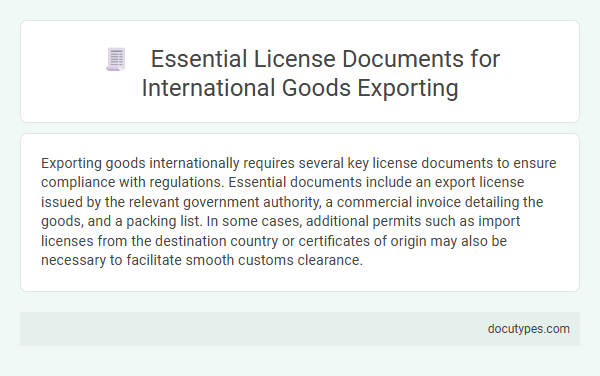Exporting goods internationally requires several key license documents to ensure compliance with regulations. Essential documents include an export license issued by the relevant government authority, a commercial invoice detailing the goods, and a packing list. In some cases, additional permits such as import licenses from the destination country or certificates of origin may also be necessary to facilitate smooth customs clearance.
Introduction to Essential License Documents for International Goods Exporting
Exporting goods internationally requires several essential license documents to ensure compliance with trade regulations. These documents verify the legality of the export and facilitate smooth customs clearance in both the exporting and importing countries. Proper understanding and preparation of license documents help avoid delays and penalties in international trade operations.
Understanding Export Licenses: Types and Purposes
Export licenses are essential documents that authorize the shipment of goods across international borders. These licenses ensure compliance with regulations set by export control authorities to prevent unauthorized trade.
There are several types of export licenses, including general, validated, and individual licenses, each serving different purposes based on product category and destination. Understanding the specific license you need helps streamline your export process and avoid legal penalties.
Commercial Invoice: Key Information for Customs Clearance
Exporting goods internationally requires specific license documents to ensure smooth customs clearance. The commercial invoice is a crucial document that contains key information required by customs authorities.
- Itemized Description - The commercial invoice must include a detailed description of each exported item to clearly identify the goods.
- Value Declaration - Accurate monetary value of the goods is necessary for customs duties and tax calculations.
- Exporter and Importer Details - Complete names and addresses of both the exporter and importer help verify the transaction and shipments.
Bill of Lading: Transportation and Ownership Documentation
The Bill of Lading is a crucial document for exporting goods internationally, serving both as a transportation receipt and a proof of ownership. It ensures the legal transfer of goods from the exporter to the consignee during shipment.
- Proof of Shipment - The Bill of Lading confirms that the carrier has received the cargo for transport.
- Title of Goods - It acts as a document of title, allowing ownership transfer of the goods.
- Contract of Carriage - The Bill of Lading outlines the terms and conditions between the shipper and carrier.
This document is essential for customs clearance, payment procedures, and resolving disputes in international trade.
Certificate of Origin: Verifying Product Nationality
The Certificate of Origin is a fundamental document required for exporting goods internationally. It verifies the product's nationality, confirming where the goods were manufactured or produced.
Customs authorities use the Certificate of Origin to determine tariff rates, trade policies, and import restrictions based on the product's country of origin. Exporters must obtain this document from authorized agencies, often chambers of commerce or governmental bodies. Accurate and timely certification prevents shipment delays and ensures compliance with international trade regulations.
Export Packing List: Detailed Shipment Description
Which license documents are required for exporting goods internationally, specifically regarding the Export Packing List? The Export Packing List provides a detailed shipment description, which is essential for customs clearance and logistics. It includes information such as package contents, weights, dimensions, and handling instructions to ensure smooth transport and compliance with export regulations.
Export Declaration Documents: Regulatory Compliance
Export declaration documents are essential for regulatory compliance when exporting goods internationally. These documents include custom declarations, export licenses, and certificates of origin, ensuring adherence to destination country regulations. Proper submission of export declarations helps prevent legal issues and facilitates smooth customs clearance processes.
Insurance Certificate: Protecting Goods in Transit
An Insurance Certificate is a critical license document required for exporting goods internationally. It provides proof that the shipment is insured against potential risks during transit.
This certificate covers damages, loss, or theft, ensuring financial protection for exporters and importers. Adequate insurance minimizes the risk of unexpected expenses, making it essential for international trade compliance.
Inspection Certificate: Quality and Standards Assurance
Exporting goods internationally requires specific license documents to ensure compliance with regulations. An Inspection Certificate plays a critical role in verifying the quality and standards of your products.
- Inspection Certificate Validates Quality - Confirms that exported goods meet the required quality standards set by the importing country.
- Essential for Regulatory Compliance - Helps satisfy customs and border authorities by providing proof of product inspection and adherence to standards.
- Supports Smooth Customs Clearance - Reduces delays in shipment processing by certifying that goods conform to international quality specifications.
Which License Documents Are Required for Exporting Goods Internationally? Infographic

